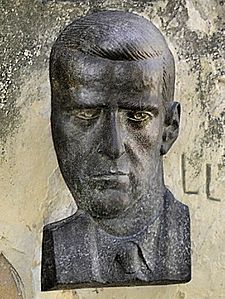Joaquín Maurín facts for kids
Quick facts for kids
Joaquín Maurín
|
|
|---|---|

Commemorative plaque of Joaquín Maurín
|
|
| Leader of the Workers' Party of Marxist Unification (POUM) | |
| In office 1935–1936 |
|
| Preceded by | Position established |
| Succeeded by | Andreu Nin Pérez |
| Member of the Congress of Deputies | |
| In office February 1936 – July 1936 |
|
| General Secretary of the Workers and Peasants' Bloc (BOC) | |
| In office 1931–1935 |
|
| General Secretary of the National Confederation of Labor (CNT) | |
| In office 1921–1922 |
|
| Preceded by | Andreu Nin Pérez |
| Succeeded by | Joan Peiró |
| Personal details | |
| Born |
Joaquín Maurín Juliá
12 January 1896 Bonansa, Huesca, Spain |
| Died | 18 August 1950 (aged 65) New York City, New York, United States |
| Political party | Workers' Party of Marxist Unification Workers and Peasants' Bloc |
| Occupation | Politician, trade unionist |
Joaquín Maurín Juliá (in Catalan: Joaquim Maurín, born January 12, 1896 – died November 5, 1973) was an important Spanish politician and activist. He was a leader in workers' movements, especially in Catalonia, a region in Spain. Joaquín Maurín helped create and lead two major political groups: the Workers and Peasants' Bloc (BOC) and the Workers' Party of Marxist Unification (POUM).
Contents
Early Life and Beginnings
Joaquín Maurín was born in Bonansa, a town in Huesca, Aragon, Spain. From a young age, he became interested in socialist ideas. He often faced legal challenges because of his political activities.
Joining Workers' Movements
After studying law, Maurín worked in Lleida, Catalonia. There, he joined the Confederación Nacional del Trabajo (CNT), which was a large workers' union. In 1920, he became a local secretary for the CNT. He also edited their weekly newspaper, Lucha Social.
In 1921, Maurín traveled to Moscow, the capital of Soviet Russia. He represented the CNT at a big meeting called the Profintern Congress. When he returned, he was chosen as the general secretary of the CNT. Soon after, in February 1922, he was arrested.
After his release, Maurín started a new group called the Comités Sindicalistas Revolucionarios. This group aimed to bring new ideas into the CNT. He also launched their own newspaper, La Batalla, in December.
The Communist Party of Spain
In 1924, Maurín's newspaper, La Batalla, joined forces with the Communist Party of Spain. He then helped organize the party's local branch, the Catalan-Balearic Communist Federation (FCCB).
During a time when the dictator Miguel Primo de Rivera was in power, many opposition groups were suppressed. Maurín was arrested and jailed in January 1925. He was released in 1927 and decided to leave Spain for Paris.
However, he returned to Barcelona in 1930. He worked to restart La Batalla before the Second Spanish Republic was declared in 1931. Maurín began to disagree with the policies of Stalin in the Soviet Union. He became part of a group known as the international Right Opposition. Because of these disagreements, he left the Communist Party of Spain. He led the FCCB to become an independent political group.
Leading the BOC and POUM
On March 1, 1931, the FCCB joined with the Catalan Communist Party. In 1933, they became the Iberian Communist Federation. Their goal was to become a major political force across Spain.
The combined group of the FCCB and the Catalan Communist Party formed a large organization called the Workers and Peasants' Bloc (BOC). Joaquín Maurín became its general secretary. The BOC grew to be very strong in Catalonia.
In 1934, there were riots in Spain. Maurín suggested forming "Workers' Alliances" (Alianzas Obreras) across the country. This idea was inspired by similar movements in Asturias. After these movements ended without a clear victory, Maurín's party decided to team up with Andreu Nin's group, the Trotskyist Communist Left of Spain.
This merger happened in September 1935. The two groups formed the Workers' Party of Marxist Unification (POUM). Maurín was chosen as its general secretary.
The POUM believed in unified action among workers. So, they joined the Spanish Popular Front for the elections in February 1936. Maurín was elected to the Spanish Congress of Deputies as part of the Popular Front.
Arrest and Life in Exile
When the Spanish coup of July 1936 happened, starting the Spanish Civil War, Maurín was in Galicia, a region controlled by Franco's forces. He tried to escape through Aragon but was captured in Jaca.
His trial didn't happen until 1944, and he was sentenced to 30 years in prison. However, he was held until October 1, 1946. He was then released under an amnesty for some political prisoners. He had to stay in Madrid and worked as a translator.
Maurín saw the rise of Francoist Spain and the suppression of the POUM by Stalin's forces. In 1947, he and his family moved to the United States. There, he started his own news agency and continued to publish his writings. Joaquín Maurín passed away in New York City.
See also
 In Spanish: Joaquín Maurín para niños
In Spanish: Joaquín Maurín para niños
 | Bessie Coleman |
 | Spann Watson |
 | Jill E. Brown |
 | Sherman W. White |

